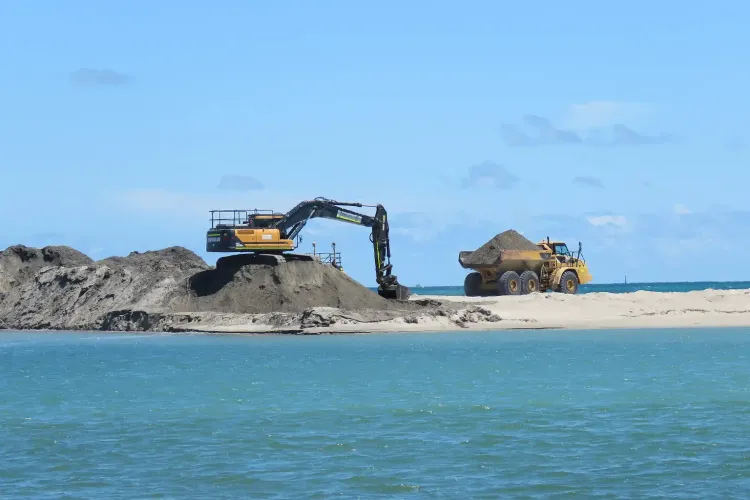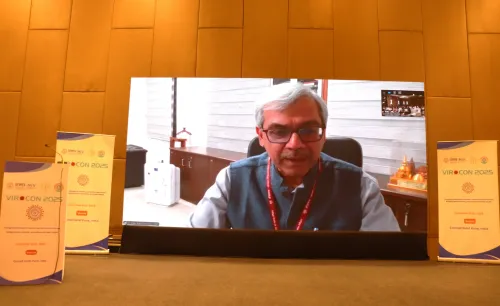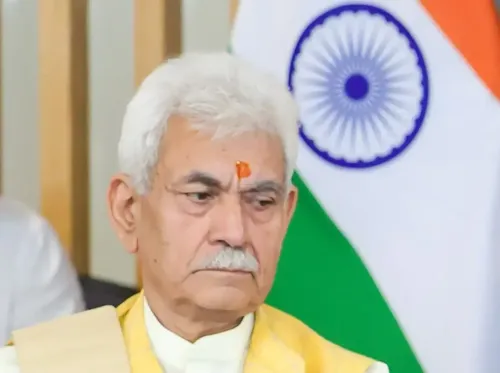Tamil Nadu to Reallocate 1.4 Crore Tonnes of Illegally Stockpiled Beach Sand Minerals to Indian Rare Earths Ltd

Synopsis
Key Takeaways
- Tamil Nadu transfers 1.4 crore tonnes of illegal beach sand minerals.
- Indian Rare Earths Ltd (IREL) to receive the stock.
- Action follows a Madras High Court directive.
- High-level committee formed to oversee the transfer.
- Investigation into illegal mining operations continues.
Chennai, April 15 (NationPress) The government of Tamil Nadu has mandated the transfer of 1.4 crore tonnes of beach sand minerals, which were reportedly hoarded unlawfully by private entities, to the public sector undertaking Indian Rare Earths Ltd (IREL). This action represents a crucial move towards ensuring accountability after prolonged disputes regarding illegal mining activities along the southern coastline of the state.
An official notice, issued by Additional Chief Secretary of the Natural Resources Department, K. Phanindra Reddy, on April 8, 2025, outlines the procedures for this transfer.
The process will include the beach sand mineral stocks currently stored at various locations such as godowns, factories, stockyards, and mining sites in Tirunelveli, Thoothukudi, and Kanniyakumari districts.
The transfer will commence once preliminary pricing information — factoring in transportation and security expenses — is established.
This initiative follows a directive from the Madras High Court, which ordered the seizure of illegally extracted beach sand minerals.
The court granted the state the authority to take possession of all forms of raw, processed, or semi-processed minerals held by private entities after confirming the findings of numerous investigative reports, including those submitted by IAS officers Gagandeep Singh Bedi and Satyabrata Sahoo, along with reports from the Amicus Curiae and reassessment documents.
The Union Government had previously revoked private mining licenses in 2019 due to extensive violations and enforced a complete ban on beach mineral mining, which was first imposed in September 2013.
The Satyabrata Sahoo Committee identified that over 1.5 crore tonnes of minerals — including garnet, ilmenite, rutile, zircon, sillimanite, and leucoxene — were found under the control of private companies.
However, a reassessment conducted in 2023 indicated that only 1.4 crore tonnes remained, suggesting that a significant quantity may have been unlawfully extracted.
During the 2017-18 court-ordered investigations, authorities sealed 49 godowns in these three districts to prevent any further tampering or movement of the minerals.
To manage the transfer to IREL, the state government has established a high-level committee that includes the Commissioner of Geology and Mining, the CEO of the Tamil Nadu Infrastructure Development Board, and the Special Secretary of the Finance Department.
This committee is responsible for determining the fair market value of the confiscated minerals.
Additionally, the District Collectors of Tirunelveli, Thoothukudi, and Kanniyakumari will form multidisciplinary monitoring teams.
These teams will consist of officials from the Revenue, Survey, Geology and Mining Departments, the Atomic Minerals Directorate, and IREL.
The teams will oversee the secure transport of the stock and ensure continuous police protection at storage locations.
The government has also instructed these district authorities to initiate recovery proceedings for the assessed mineral value and royalty — which amounts to Rs 5,832 crore — from the lessees implicated in illegal mining, transportation, and export activities between 2000 and 2017.
Simultaneously, the Madras High Court has directed the Central Bureau of Investigation (CBI) to form Special Investigation Teams composed of officers with proven integrity and technical knowledge.
These teams are expected to investigate the methods of illegal mining, the involvement of government officials, and the financial losses incurred by the state.
The court has also requested that the Union Government review the financial and commercial transactions of the implicated companies and, if needed, engage agencies such as the Enforcement Directorate (ED), Income Tax Department, Customs and Excise, and the Commercial Taxes Department.
Notably, on April 6, the CBI executed raids at properties linked to V.V. Minerals and its promoter S. Vaikundarajan in Keeraikkaaranthattu near Thisaiyanvilai, as part of the investigation into the Rs 5,832 crore beach sand mining scandal.










